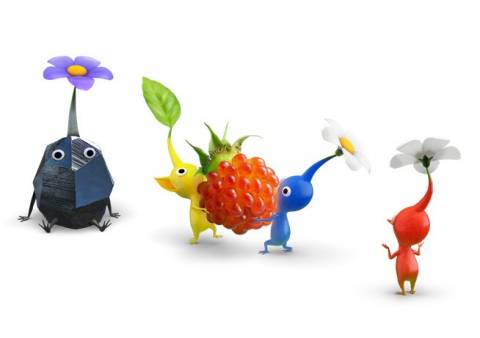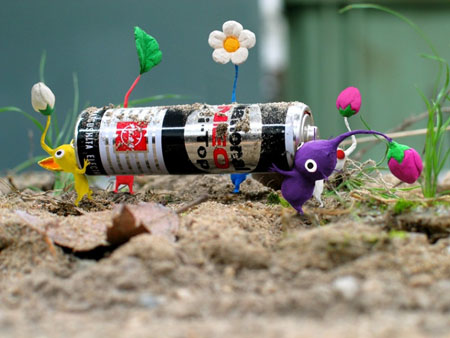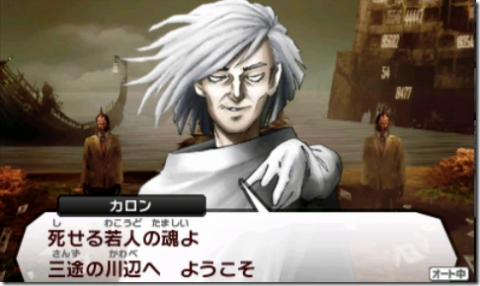Why I cry when Pikmin die
By Masterherox 0 Comments
I was playing Starcraft 2 the other day, and going throught he process of carrying out what may have been the greatest strategy ever concocted against the AI in it's story mode. In fact, I was very nearly done filling my fighting force with nothing but marines when the AI got tired of waiting and rolled right in. From there, things went as you'd expect (I.E. Not well for me) and I was quite a huge number of marines as a result. My immediate response? Rage, of course (I started planning vengeance but that never went anywhere, and isn't really relevant anyway).
A few days later, I was playing through Pikmin. Once again, I was readying a massive force in an attempt to crush one of the bosses. Then things went wrong again, as they are wont to do, after a mis-timed rush. In a matter of moments, I had lost nearly fifty Pikmin, at least a few dead from each color. My response this time? I was on the verge of tears.
Now, theoretically these two scenarios should produce more or less the same outcome. Either way, a dumb move on my part got a ton of my soldiers killed. The fact is, though, that they didn't, and I know I'm not the only one that thinks so. So, why did people dying in Starcraft get me angry when Pikmin dying got me sad? There has to be a reason that one game has units people find to be cannon fodder while the other has units that have no-death runs associated with them.

Lets look at the obvious answers. First off: Pikmin are adorable Seriously, look at them. They look adorable, they move adorably, even when they go and pose they're adorable. They make cute sounds, they have stubby little arms, and they're always ready to do what you need them to.
Human beings are notorious for making cute things take greater importance than ugly things. If you hurt a person, you're a criminal and some people dislike you, but most don't really care. Hurt a cute animal, and the whole world turns on you. I don't know the exact psychology behind it, but I don't think anybody can doubt that in most cases, cute things are treated a bit better than other, uglier things.
Now the second, not quite as obvious as the first but still pretty big answer: Their personality. Now, the Starcraft marines have a sort of personality. They can talk, say funny lines, and respond to you when you send them places. However, especially considering the fact that you very rarely ever get up close to any of them, you rarely see anything more from them.
Pikmin on the other hand seem almost crafted to exude charm and personality. From the different sounds they make as things happen to them, to the little things they do when they get away from you, to the way that they will straight up sing for you , they seem more like living, breathing creatures than the marines ever did for me.

And third, the also obvious answer that I've been holding onto because third is where the good stuff goes: What happens when they die
It's a small thing, yes, but can you honestly tell me that the combination of tiny-floating Pikmin ghost and that little death noise they make just cuts me to the bone.
Now, ask most people who get sad when Pikmin die, and it's likely that they'll give you one of these three answers. However, there's a few more points I'd like to put forward that are a bit less obvious than the others.
In most RTS games, you tend to get units wholesale: you build them, they pop out, all done. TAfter that, you use them for the remainder of the match and forget about them afterwords.
Pikmin have a different process. In fact, I daresay they have a lifespan. Everything starts when you personally pluck them out of the ground and they start following you around. From then on, they're yours, and will follow you everywhere you go (unless you tell them otherwise, of course). You take them around, you conquer monsters and challenges with them, you grow them into flower pikmin, and so on and so forth. All this creates something of a bond between you and the Pikmin. You were there when they were born, you're around for everything they do for you, and you're most likely going to be there when they die. In fact, chances are you are the reason that they die.

If a Pikmin drowns, nine times out of ten it's because of something you did. If they are burnt or electrified or crushed, it's usually because you put them in that sort of situation. Worst of all, if they're eaten, it's usually because you personally gave the order for them to attack. Taking everything above into account, whenever you issue commands to the Pikmin, it becomes a very personal thing; you are taking the creatures that have done so much for you and are likely sending them to their deaths.
(As a side note, I personally hate it when Pikmin die due to negligence on my part. I can still accept losing twenty Pikmin during a hard fought battle, but I will go far out of my way to keep a singe Pikmin from being away from the ship at the end of the day.)
All that said, the fact that Pikmin can elicit an actual emotional response from people just based on the lives of it's basic units likely has other factors that I simply am incapable of seeing (I very nearly compared it to being a parent, but A. I'm not a parent, so I wouldn't actually know, and B. Some people might find comparing being a parent to commanding hordes of tiny cute creatures to fight and work for your sake a little offensive). Does analyzing this sort of thing have any practical use? Maybe, maybe not. All I really know is that Pikmin is one of the few games that can actually make me cry, and that's pretty impressive.
Now go listen to this song and cry yourself for a bit.


Log in to comment